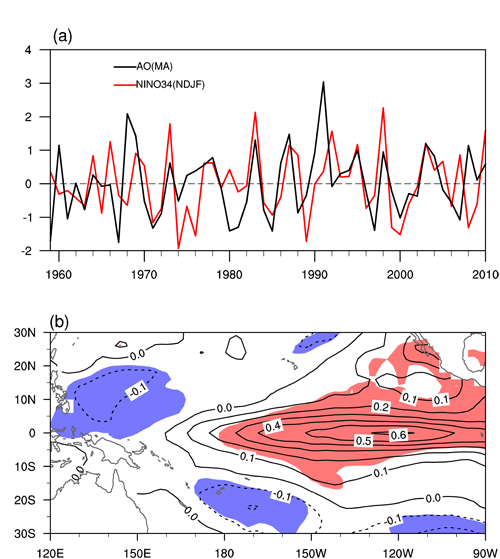A potential effective predictor for ENSO: Boreal spring Arctic Oscillation
Date:2014-11-06
The El Ni?o–Southern Oscillation (ENSO) is one of the strongest natural variability modes in the tropical Pacific, which can exert substantial influences on the global climate anomalies. Hence, to skillfully forecast the ENSO event is of great importance for both society and economy development. Recent studies by CHEN’s team find that boreal spring Arctic Oscillation (AO) could be a potential effective predictor for the prediction of ENSO events in the following winter. This finding suggests that stochastic forcing from the extratropics is essential for maintaining ENSO variability and may have profound implications for ENSO prediction, specially the spring predictability barrier issue.
CHEN’s team found that boreal spring AO can exert a significant influence on the outbreak of ENSO event in the following winter. They demonstrated that the interaction between synoptic-scale eddy activity and low-frequency flow and its associated vorticity transportation in the midlatitude North Pacific play an important role in the formation of spring AO-related cyclonic circulation over the subtropical western North Pacific. The westerly wind anomalies to the south of this anomalous spring AO-related cyclonic circulation would trigger an eastward propagating and downwelling equatorial Kelvin wave, which would subsequently lead to an El Ni?o-like warming in the tropical central -eastern Pacific in the following winter.
References:
Chen, S. F., B. Yu, and W. Chen (2014), An analysis on the physical process of the influence of AO on ENSO, Clim. Dyn., 42(3–4), 973–989.
Chen, S. F., W. Chen, B. Yu, and H. F. Graf (2013), Modulation of the seasonal footprinting mechanism by the boreal spring Arctic Oscillation, Geophys. Res. Lett., 40, 6384–6389, doi:10.1002/2013GL058628.
Chen, S. F., W. Chen, and B. Yu (2014), Asymmetric influence of boreal spring Arctic Oscillation on subsequent ENSO, J. Geophys. Res. Atmos., 119,11,135–11,150, doi:10.1002/2014JD021831.
Chen S. F, B. Yu, and W, Chen (2014), An interdecadal change in the influence of the spring Arctic Oscillation on the subsequent ENSO around the early 1970s. Clim. Dyn, doi: 10.1007/s00382-014-2152-2

(a). Normailied time series of spring AO index and NINO34 index in the following winter (b). SST anomalies (°C) in the following winter regressed on the normalized spring AO index. The shading in (b) indicates anomalies that are significantly different from zero at the 95% confidence level.
